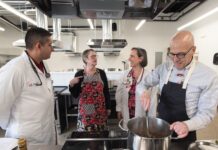
Dr. Jacek Zurada, professor of Electrical and Computer Engineering, went on record last December as Google Scholar, the citation search engine flagged a distinctive mark of 10,000 citations found to his published research. Zurada has authored several textbooks and more than 380 refereed publications in computational intelligence, machine learning for classification and feature extraction and image/signal processing. Zurada has taught in UofL’s Electrical & Computer Engineering Department since 1989.
He took time out of his schedule to talk to UofL News about his research and what it means to achieve 10,000 citations.
UofL News: Could you tell us more about your research?
Zurada: My specialty is machine learning and artificial intelligence. Both deal with theory and development of computer systems that are able to perform tasks which normally require human intelligence, such as visual perception, speech recognition, decision-making, and translation between languages. These are emerging technologies that have an amazing range of applications and serve humanity by making our lives easier and more connected, and also promote social good. I’m sure you own a smartphone, the flagship achievement of AI of our generation.
UofL News: What does it mean to have such a high citation score? To what do you attribute this distinction?
Zurada: Traditionally, researchers had difficulties with quantifying their research contributions. The number of publications that people author or co-author is not a good metric, because publications can both be in quality journals and conferences, but also can be submitted to outlets that require no reviews prior to publication and would accept papers with little to no vetting by peers. While the former approach requires a lot of effort, the latter is a more opportunistic and less risky path that I’d compare to posting on blogs, usually done without the rigors of peer review. To sum it up – having published 50 papers in your career doesn’t tell the full story. It’s because the research impact of a paper is initially reflected by the journal title where it has been published, but it’s ultimately and accurately evidenced only several years later by how many times other researchers have cited your work. And they tend to reference papers that have been reviewed and appeared in high impact journals.
There is a general consensus in the research community that the number of citations to your body of work is the ultimate metric to evaluate the impact of your research. It’s a first-hand measure of how many times people read, notice and refer to your work in order to extend or improve it. To help answer these questions from researchers, Google Scholar has equipped us with a fantastic public tool for searching through scientific literature. It also helps authors to keep track of citations to their articles and thus monitor the impact of their work.
UofL News: Was this gradual? Did your research evolve to fit more into the zeitgeist, so to speak, or vice versa?
Zurada: My first cited publications related to my PhD work. More recent citations have been to a very well received 2009 paper that collected over 400 citations and was published while I was on sabbatical. In the meantime, citations by other authors to some 380 papers of mine keep growing at a rate exceeding 600/year for the last 6 years.
UofL News: How does this (citation milestone) influence your work?
Zurada: Obviously, citations offer an author a great deal of encouragement, if not a public approval for the idea. They also validate the work that your team is doing. When you publish something, you initially don’t know its future impact. So, when people carry on what you have started, that’s a big deal. It indicates that you’ve done something seminal or inspiring, or of high impact that others want to continue or expand. However, when writing a research article, I pay no attention to its future citations. Frankly, I know of no ways to engineer your citations. I focus, however, on how to contribute an original method, outline a new theory, describe a new application, or offer insights into data that I and my students have studied. Novelty, usefulness, and a lucid presentation in a high impact journal are all ‘must have’ of a good, citable publication and are true gatekeepers for your future citations.
UofL News: How do you balance your research and other (teaching, administrative, professional) responsibilities?
Zurada: University teaching, especially graduate teaching, reinforces our research and all academics agree on this. While administrative duties on campus can be viewed by some as distraction from research, we also need to realize that a collective effort is needed for the university to smoothly function as an institution of higher learning. Therefore, input from faculty with considerable research experience to the university governance is necessary. I therefore had to find the time to serve in such roles as a Speed School Senator and as a Parliamentarian for the Faculty Senate, member of the Speed Faculty Activity Committee, Graduate Council member and as a Chair of the ECE Curriculum Committee.
This still leaves me the time to be actively engaged in the Institute of Electrical and Electronics Engineers, which, with over 400,000 members, is the world’s largest professional organization. It happens to be an organization created for and by electrical and electronic engineers. It is well known and highly regarded for advancing technology for humanity and for its vast and prestigious intellectual property. I have served as IEEE Vice President in 2013-15, and was Chair of its Periodicals Committee and Periodicals Review Committees in 2010-13. I am also an IEEE Life Fellow.
UofL News: What advice do you have for burgeoning researchers?
Zurada: My first and lofty message for aspiring researchers-authors is that you don’t write a paper for yourself, neither for your chair or dean or a promotion committee, but for the readers and in a broader sense you target the humanity. The wider your target audience, the more success can be scored. My other message is of more practical nature: authors need to pay careful attention to the reproducibility of results presented in their papers so that other researchers with a similar specialized knowledge could replicate the papers’ outcomes. Dead-ended publications with no follow up aren’t useful because when our published disclosures can’t be applied, improved on or otherwise continued, our efforts have been wasted.
































